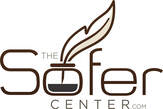What is a Mezuzah?The modern day Jewish man or woman can spend thousands of dollars for protection using electronic alarm systems, guard dogs or fences, when the most powerful tool in his or her home defense is Biblical in root and less expensive: the Mezuzah.
A Mezuzah literally means "doorpost." It must be placed at the entrance of every Jewish person's home. One should also be affixed at every door within a home, except bathrooms and closets, to sanctify G-d's presence as we move from one domain or sphere to the next. The actual Hebrew word Mezuzah translates as “doorpost,” and has also come to refer to the skillfully made parchment scroll within. And while the Mezuzah is often thought of in terms of its ornamental nature, its true power lies from the rolled up scroll within that consists of two paragraphs of the "Shema" prayer, Deuteronomy 6:4-9. The first paragraph declares the oneness of G-d. The second states G-d's direction to "write these words on the doorpost of your house and your gates." Today, to fulfill this mitzvah, we obtain already written kosher scrolls. To be kosher, the Mezuzah scroll must be written by an observant Jew who uses kosher quill and ink on parchment created from the skin of a kosher animal. On the reverse side of the Mezuzah parchment is the word Shadda-i (Almighty), one of G-d's many names. It is an acronym Shin Dalet Yud for the words Shomrei Dalatot Yisroel -- "He guards the doors of Israel." The Hebrew letter "Shin" represents the word "shomer," to guard, and is often on the mezuzah casing. The "Dalet" stands for the word "door." The last letter, the "Yud," represents "Yisroel," the people of Israel. So, what is a Mezuzah? It is a short public declaration, affixed to a doorpost, that G-d will guard the Children of Israel for their singular belief in him, for carefully following direction he has outlined from the food we eat, to the words we use, to our actions. Having a Mezuzah is only as good as the scroll within it. Rabbi Kass from the Sofer Center has been trained to perform the meticulous work necessary to make and inspect a Mezuzah. Some Mezuzah scrolls wear down over time and thus become not kosher. Letters crack or oxidize by exposure to the weather. But unfortunately, in some cases, scrolls sold by others from the outset may not be kosher. Standard setting organizations have estimated in the past that worldwide 80 to 90 percent of all Mezuzahs are not kosher. Reasons vary. Some scrolls have been mass produced from a copying machine and not originally written as required.Others have been written by lesser trained and skilled individuals who pass on their flawed product, including smeared letters, to retailers who are not trained to recognize errors.Even the best scribes can be prone to occasional error in the 713 letters that comprise a Mezuzah. Regardless of the source of error, such a Mezuzah serves no purpose. To have the peace of mind that your Mezuzah is fulfilling the obligation to have a Mezuzah attached to your doors, visit The Sofer Center. Using a powerful magnifying glass, and years of experience, Rabbi Kass will check them for a nominal fee.A Mezuzah scroll is mounted on the doorpost, designating the home as Jewish and reminding us of our connection to G‑d and our heritage. Its presence reminds us to infuse our daily doings with holiness and good deeds. More in Depth The oral law which G-D thought Moshe on Mount Sinai teaches us that the Mezuzah must be hand-written with ink on parchment according to strict Halachic codes. It is handwritten in the original Hebrew by an expert scribe, known as a sofer. It is then checked for textual errors and incorrectly formed letters. Only then, is a “kosher” Mezuzah placed in a cover or case made of glass, wood, metal or any other material and, upon recitation of a blessing, affixed to the doorpost. The Biblical source for the Mitzvah of Mezuzah is found twice in Devarim 6:9 and 11:20. The two Parshios are 1) “Shema” and 2) “Vehoya im Shamoa” 1) Shema – The biblical passage declaring G‑d’s unity and our devotion to Him. 2) Vehoyo im Shamoa – The basics of reward and punishment,two fundamentals of faith. The Torah states in both paragraphs “And you shall write (these words) on the entryways of your dwellings and your gates” |
The Mezuzah serves as a reminder that G-d is the one unique creator and governor of the world.
In addition to its role as a declaration and reminder of our faith, the Mezuzah is also a symbol of G‑d’s watchful care over the house and its dwellers. While we usually place our most precious ritual items in a safe, here G‑d tells us to affix the Mezuzah out in the open, on the doorpost. The Shema prayer appears on one side on the parchment, and one of the names of G‑d, Sha-dai, appears on the reverse side. The name is an acronym for the Hebrew words which mean “Guardian of the doorways of Israel.” A Mezuzah on the doors of a home or office protects the inhabitants – whether they are inside or outside. This protection serves as a helmet, one protective veneer against all the surrounding dangers in our lives. When passing through a doorway where a Mezuzah has been affixed, we glance at it, touch it, and some kiss their finger tips and then touch the Mezuzah. This serves as a regular reminder throughout the day that G‑d is always with us inside or outside our homes. Through the observance of this divine commandment we introduce a measure of spirituality and security into our homes. G‑d promises that anyone who carefully observes the mitzvah of Mezuzah will lead a longer, richer life, as will their descendants; as Deuteronomy states, “so that you will prolong your days and the days of your children…” (11:21). Although we must fulfill each mitzvah regardless of the promise of material gain, this can be a further incentive to be careful in the fulfillment of this mitzvah and to acquire quality kosher Mezuzos.At the Sofer Center we have a large selection of Mezuzos, some really basic ones and others that are very Mehudar. The prices range from forty five to one hundred and seventy five dollars. When it comes to purchasing Mezuzos it is important realize, that like everything the more you pay the more you get. It takes a Sofer several hours to write a Mezuzah, so as you can imagine if you see a Mezuzah being sold for fifteen or twenty dollars alarm bells should go off in your head. In the early 1980′s the Judaica market was flooded with inexpensive Mezuzas that came sealed in packages endorsed by the Israeli Rabbinate. An investigation was made and it was discovered that the Israeli Rabbinate did not endorse these Mezuzos and in fact many were written by nonreligious Jews, women, and non Jews or collected from old posul Mezuzos awaiting burial. The Chief Rabbinate informed the public not to use such Mezuzos and that the endorsement was null and void. Unfortunately these Mezuzos are still around today. That is why it is important to purchase from someone you know and can trust that his Mezuzos come from a Kosher source even if it costs more. |
What our clients say about us: |
To enhance our service quality, we operate on an appointment-only basis.
Please contact us to make an appointment. $12.99 Flat rate shipping! Mezuzahs, Tefillin & Accessories! |
|





